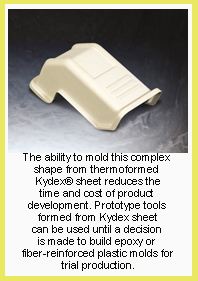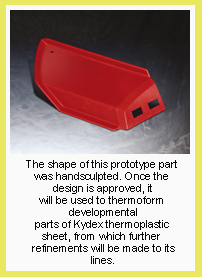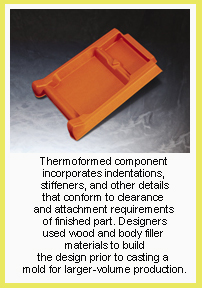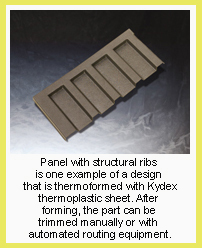|
Sheet Offers Versatility In Product Development
 Prototyping is a critical phase of
product development. Designers
and engineers must determine
how best to combine form and
function, aesthetics and ergonomics,
durability and performance in an
appealing package that’s coordinated
with market needs, while working
within their budgets. Multiple iterations
of product design are often necessary
before the right balance of
properties is achieved.
Prototyping is a critical phase of
product development. Designers
and engineers must determine
how best to combine form and
function, aesthetics and ergonomics,
durability and performance in an
appealing package that’s coordinated
with market needs, while working
within their budgets. Multiple iterations
of product design are often necessary
before the right balance of
properties is achieved.
 And herein
lies a challenge: many design teams
work with tight budgets. This means
there is little leeway in the productdevelopment
cycle for experimentation
and adjustment, especially when
it involves costly delays due to
redesign.
And herein
lies a challenge: many design teams
work with tight budgets. This means
there is little leeway in the productdevelopment
cycle for experimentation
and adjustment, especially when
it involves costly delays due to
redesign.
“Nevertheless,” says Claude
Gidman, an award-winning industrial
designer and founder of Gidman
Design Associates Ltd., Toronto,
“engineers and designers can greatly
improve the properties and performance
of a product by refining key features,
including its shape.”
“At Gidman Design, we find that
the more we experiment with shape,
the greater the strength and quality
that can be obtained without
increasing cost,” he says. “Failing to
take advantage of creative shaping
opportunities can result in product
coverings which can be bland, less
effective functionally and less appealing
in the marketing process.”
Gidman says his company has
found efficient ways to quickly and
economically develop, test and make
changes to product-design concepts.
“We fabricate
 prototypes and tooling
of Kydex® sheet, a thermoplastic
alloy that can be readily shaped with
thermoforming.”
prototypes and tooling
of Kydex® sheet, a thermoplastic
alloy that can be readily shaped with
thermoforming.”
Kydex sheet,
manufactured by
Kleerdex Company, LLC, Bloomsburg,
PA, is effective for prototyping,
notes Gidman. The material can be
heat-fabricated or thermoformed into
complex shapes, making it suitable
for designs where it houses, supports,
protects or decorates products. It can
also be used like stamped or pressed
sheet metal to create covers and
enclosures but without the need for
surface treatment, complex tooling or
painting. It is rigid, durable, firerated,
resistant to impact and a variety
of chemicals and comes in a range
of standard and custom colors, sizes,
thicknesses and surface textures.
Kydex sheet also meets or surpasses
code requirements for many applications,
such as those in most transportation
interiors.
When properly designed, tooled
and formed, parts fabricated of
Kydex sheet don’t thin out at the
edges. Product developers can thus
use the material in a relatively lowcost
process like
 thermoforming to
improve and test a design and undertake
pilot production before transferring
it to a more expensive process
like injection molding for commercial
manufacture.
thermoforming to
improve and test a design and undertake
pilot production before transferring
it to a more expensive process
like injection molding for commercial
manufacture.
The sheet can also be thermoformed
into tooling at minimum
expense. Gidman Design has been
able to make up tooling, adequate
for 10 to 20 parts and sometimes
more, in its design studio and
model shop and repeatedly modify
it with simple wood and body-filler
materials to develop the shapes
needed for testing. From prototyping
it’s a simple step to thermoform
parts of Kydex sheet in quantities
of 50, 100 or into the thousands.
For higher volumes it is necessary
to have epoxy or reinforced
tooling made. Gidman says this
type of tooling can usually be fabricated
by casting resin into the back
sides of prototype parts made of
Kydex sheet rather than producing
patterns from drawings and complex
computer-aided design work,
an expensive and time-consuming
process.
As with any material, there is a
learning curve involved when working
with Kydex sheet. Its chemical
resistance, for example, means it
rejects most adhesives, so doublesided
tapes and glues need to be
used when attaching fasteners and
other hardware in applications like
seat parts and some types of covers
and shrouds. Finding the right thermoforming
temperature depends on
various factors like part shape, he
notes and requires trial-and-error
adjustments. Deep draws are achievable,
providing the shaping and
lead-up tooling is prepared appropriately
and according to how the
sheet behaves when formed,
Gidman adds.
For more information, contact
Richard Cort, Kleerdex Company,
LLC, 6685 Low Street, Bloomsburg,
PA 17815, 800-325-3133, Fax:
803-642-6867, E-mail: info@kleerdex.com, Web: www.kydex.com.
|